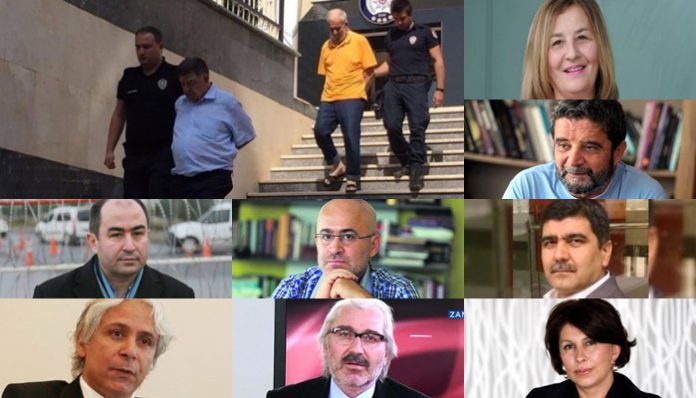An İstanbul prosecutor has demanded aggravated life sentences for nine journalists in a trial of employees of the former Zaman daily, which was closed by the government for its alleged affiliation with the Gülen movement.
There are 31 defendants in the indictment, 17 of whom are jailed. Mümtaz’er Türköne, Ali Bulaç, Ahmet Metin Sekizkardeş, Ahmet Turan Alkan, Alaattin Güner, Cuma Kaya, Faruk Akkan, Hakan Taşdelen, Hüseyin Turan, İbrahim Karayeğen, Mehmet Özdemir, Murat Avcıoğlu, Mustafa Ünal, Sedat Yetişkin, Şeref Yılmaz, Yüksel Durgut and Zafer Özsoy have been in pretrial detention for almost 19 months.
Eight defendants who were earlier released are Şahin Alpay, İhsan Dağı, Orhan Kemal Cengiz, Nuriye Akman, Lale Kemal, Onur Kutlu, İsmail Küçük and Hüseyin Belli. The remaining journalists are being tried in absentia.
Feza Gazetecilik owned the then-best selling Zaman daily, which was seized by the Turkish government on March 4, 2016 and closed down in the aftermath of a controversial coup attempt on July 15, 2016.
According to the prosecutor’s legal opinion, the nine prominent journalists, including Mümtaz’er Türköne, Ali Bulaç and Şahin Alpay, “violated the constitution.” In addition, the prosecutor demanded up to 15 years for each of the nine on charges of “membership in an armed organization.”
Other defendants for whom the same sentence was demanded are İbrahim Karayeğen, Mehmet Özdemir, Mustafa Ünal, Ahmet Turan Alkan, İhsan Duran Dağı and Orhan Kemal Cengiz.
For the 20 other defendants, the prosecutor demanded jail sentences of between seven and 15 years at the most recent hearing, which took place on Thursday at the İstanbul 13the High Criminal Court, on the grounds of Silivri Prison. Those charges include “membership in an armed organization” and “aiding the organization without being a member of it.”
The court is expected to announce its decision later this week after the defendants and their lawyers give their closing arguments.
The only evidence cited in the indictment as proof of “terrorism” and “coup plotting” are the published articles and op-ed pieces for some of the defendants, and serving as administrators for the newspaper for others. Articles that commented on major graft investigations that were made public Dec. 17-25, 2013 and that implicated Erdoğan, his family members and his political and business associates were included in the indictment as criminal evidence and somehow linked to the July 15, 2016 coup attempt.
Ironically, the prosecutor himself said earlier that the articles themselves did not carry any element of crime yet when considered collectively they must be construed as aiming to overthrow the government.
During the first and second hearing, the defendants persistently asked any for concrete evidence that shows they committed the terror crimes mentioned in the indictment. The prosecutor failed to present any.
Most of the defendants have been jailed since August 2016.
The public prosecutor today referenced three articles of the Turkish Penal Code (TCK) as follows:
TCK 309/1 (Offenses against the Constitutional Order and its Functioning): Any person who attempts to abolish, replace or prevent the implementation of, through force and violence, the constitutional order of the Republic of Turkey shall be sentenced to a penalty of aggravated life imprisonment.
TCK 314/2 ( Armed Organization): Any person who becomes a member of the organization defined in paragraph one (definition of Armed Organization) shall be sentenced to a penalty of imprisonment for a term of five to ten years.
TCK 220/7 (Establishing Organizations for the Purpose of Committing Crimes): Any person who aids and abets an organization knowingly and willingly, although he does not belong to the structure of that organization, shall also be sentenced for the offense of being a member of that organization. The sentence to be imposed for being a member of that organization may be decreased by one-third according to the assistance provided.
On March 20, the European Court of Human Rights (ECtHR) ruled that the right to liberty and the right freedom of expression of Şahin Alpay had been violated. On March 16, an İstanbul court ordered the conditional release of Alpay, although ruling that Alpay would be subject to house arrest and is forbidden from leaving Turkey.
The European Union and international human rights organizations have been asking the Turkish government to narrow its definition of terrorism and bring it into line with European norms. Turkey, however, refuses to do so.
Turkey is the biggest jailer of journalists in the world. The most recent figures documented by SCF show that 245 journalists and media workers were in jail as of April 4, 2018, most in pretrial detention. Of those in prison 188 were under arrest pending trial while only 57 journalists have been convicted and are serving their time. Detention warrants are outstanding for 140 journalists who are living in exile or remain at large in Turkey.
Detaining tens of thousands of people over alleged links to the Gülen movement, the government also closed down about 200 media outlets after the controversial coup attempt on July 15, 2016.
(Stockholm Center for Freedom [SCF])

